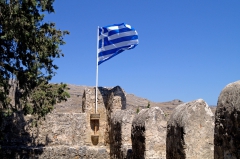Attractions
Greek national anthem
Ύμνος εις την Ελευθερίαν, Ýmnos eis tin Eleftherían, Hymn to freedom

The Greek hymn comes from a poem whose title could be translated as Hymn to Freedom (Ode to Freedom). This poem is 158 stanzas long and was written by the eminent Greek poet Dionysios Solomos (originally from the island of Zakynthos). It later became the national anthem of Cyprus.
The poem was inspired by the struggle of the Greek people in the revolution of 1821. He praises the heroism of the Greek fighters, describes their suffering and sacrifice and condemns the policy of the powers against Greece.
Seven years later, the well-known musician Nikolaos Mantzaros (from the island of Corfu) composed music for it. The work won the popularity and favour of the then King Otto I of Greece, who rewarded both composers. However, the official anthem of Greece remained the royal anthem (derived from the German imperial anthem). It was only after the abdication of the king that Parliament adopted the work Hymn to Freedom as the anthem. The melody of the song is a peculiarly uncharacteristic metre, derived from the folk dance tzamiko.
Elefthería (Freedom) is still a popular Greek female name today, referring to ancient Athena.
| Ύμνος εις την Ελευθερίαν | Ymnos is tin Eleftherian | Hymn to freedom |
| Σε γνωρίζω απο την κόψη, του σπαθιού την τρομερή Σε γνωρίζω απο την όψη, που με βιά μετράει τη γη |
Se gnorizo apo tin kopsi, tu spathiu tin tromeri. Se gnorizo apo tin opsi, pu me via metrai ti ji. |
I know you by your glow |
| Απ′ τα κόκκαλα βγαλμένη, των Ελλήνων τα ιερά. Και σαν πρώτα ανδρειωμένη, Χαίρε, Ώ χαίρε ελευθεριά! |
Ap′ ta kokkala vgalmeni, ton Ellinon ta iera. Ke san prota andriomeni, Chjere, O chjere eleftheria! |
Refined from the remains |
| Εκεί μέσα εκατοικούσες πικραμένη, εντροπαλή, κι ένα στόμα ακαρτερούσες, έλα πάλι, να σου πεί. |
Eki mesa ekatikuses pikameni, entropali ki ena stoma akarteruses, ela pali, na su pi. |
You've been hiding in the remains |
